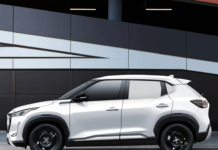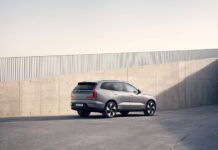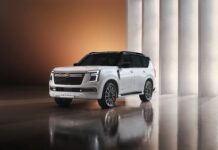Following the unveiling of its ambitious electric ecosystem just 3 months ago, Nissan today showcased the technology in action.
The ‘Nissan Electric Ecosystem Experience’ is being staged on the Spanish Island of Tenerife, demonstrating the brand’s commitment to Nissan Intelligent Mobility to transform the way people drive, and beyond the car, the way we can all live, creating a more exciting and sustainable future.
At the heart of the Nissan Electric Ecosystem Experience is the opportunity for VIP’s to drive the new Nissan LEAF, the world’s best-selling 100% electric vehicle, as well as an enhanced e-NV200, which gives users an extra 100km of range through its new 40kWh battery. Nissan also unveiled updates on its infrastructure and energy plans.
Philippe Saillard, Senior Vice President, Sales and Marketing, Nissan Europe, commented: “Nissan kick-started the electric vehicle revolution almost a decade ago. In that time we’ve sold more EV’s than any other manufacturer on the planet. But this is just the beginning. Through our vehicles and investments in infrastructure and energy services, we are on a mission to look beyond the car and transform the way we all live. This is the electric ecosystem and through our Nissan Intelligent Mobility vision, we will revolutionise the industry and modern life as we know it.”
Nissan is partnering with the Institute of Technology and Renewable Energies (ITER) to host the Electric Ecosystem Experience at ITER’s complex in Tenerife. With 25 years of experience in engineering and telecom, ITER has built a bioclimatic site powered by renewable energy from wind farms and solar panels.
The new Nissan LEAF
Headlining the Nissan Electric Ecosystem Experience is the new Nissan LEAF – the icon of Nissan Intelligent Mobility. The world’s best-selling electric vehicle has a range of 378 km NEDC. The new Nissan LEAF is also the first car to undergo WLTP. It can now travel 270 km in a combined environment (city and highway) and 415 km in city conditions on a single charge, offering an exhilarating driving experience whilst minimising range anxiety. The Nissan LEAF is packed with ingenious technology, including ProPILOT advanced driver assistance for a safer and more comfortable drive.
The car’s e-Pedal technology lets drivers accelerate and brake seamlessly using just one pedal while constantly regenerating energy. ProPILOT Park offers autonomous parking at the touch of a button. The new LEAF is already a huge success for Nissan with in excess of 12,000 customer orders received to date despite the model not being in European showrooms until early February 2018.
The enhanced Nissan e-NV200 100% electric van
Another new product at the Nissan Electric Ecosystem Experience is the enhanced Nissan e-NV200 now fitted with a new 40kWh battery. It now offers a range of up to 280 km NEDC* – 60% more than previously – with unchanged cargo space and capacity and a single-shift transmission that makes driving easier and safer. The upgraded e-nv200 has been WLTP tested with results of 301 km on city cycle and 200 km on combined cycle. Crucially, it will support city centre transformation by making the 100% electric last mile delivery a reality for business and professional drivers everywhere.
The e-NV200 powered by 40kWh battery will go on sale in selected European countries from January 2018 with first customer deliveries commencing from spring 2018.
Both vehicles are 100% electric, zero emission, enabling Nissan to bring to life its commitment to cut the level of CO2 around the world and build a more sustainable environment for everyone.
Nissan’s continuing commitment to EV infrastructure
At Futures 3.0, Nissan announced its plan to expand its existing outdoor charging network by 20% over the next 18 months. Working with EV fast-charging standard CHAdeMO, Nissan has already helped build Europe’s most comprehensive charging network, with more than 4,700 quick-chargers installed across the region.
The company is working with its leading partners, business owners and local administrations across Europe to ensure that future deployments are focused on providing maximum convenience to its drivers. New charging points will be located on highways and throughout key European towns and cities. Nissan is involved in 11 Pan-European projects to help develop quick charger networks (more details on the projects in appendix).
Energy Partnerships ‘free’ energy breakthrough for EV drivers
Nissan has also reiterated its bold mission revealed at Futures 3.0 to offer customers free power for their EVs.
Over the past year in Denmark, Nissan has been testing this revolutionary new way of driving. Going forward, this has become an offer open to all fleet customers throughout the country. Using Nissan bi-directional charging, customers can draw energy from the grid to power their car or van and then ‘sell’ it back to the grid for others to use. This means, once a nominal charge has been paid by the business for the installation of a V2G charger, there are no fuel or energy costs; just free power for their EV.
And Denmark is just the start. In the UK, Nissan has collaborated with OVO Energy to allow customers to purchase an xStorage home energy unit at a discounted price, enabling them to ‘sell’ back energy to the grid. It can result in an additional expected income for users averaging £590 / €647 per year.
Nissan is already exploring other opportunities across Europe to make ‘free’ power for EVs a milestone for the future.
Nissan’s ongoing commitment on CSR
The xStorage Home units, which have been installed at every house in ITER, will be part of a pilot project in a developing country in Africa. It will help providing sustainable energy to local communities in developing countries which do not have access to energy today. This will give communities better access to basic needs, such as education and healthcare.
Furthermore, and aligned to Nissan Europe’s sustainability objectives, Nissan has also revealed a concept based on the Nissan e-NV200 van. This vehicle is equipped with a stationary energy storage and can be used as a mobile, sustainable back-up energy source in the event of a major power cut, energy disruption or off-grid event.
Nissan will pilot these two projects during 2018 and, if they prove to be beneficial, will expand upon them.




























